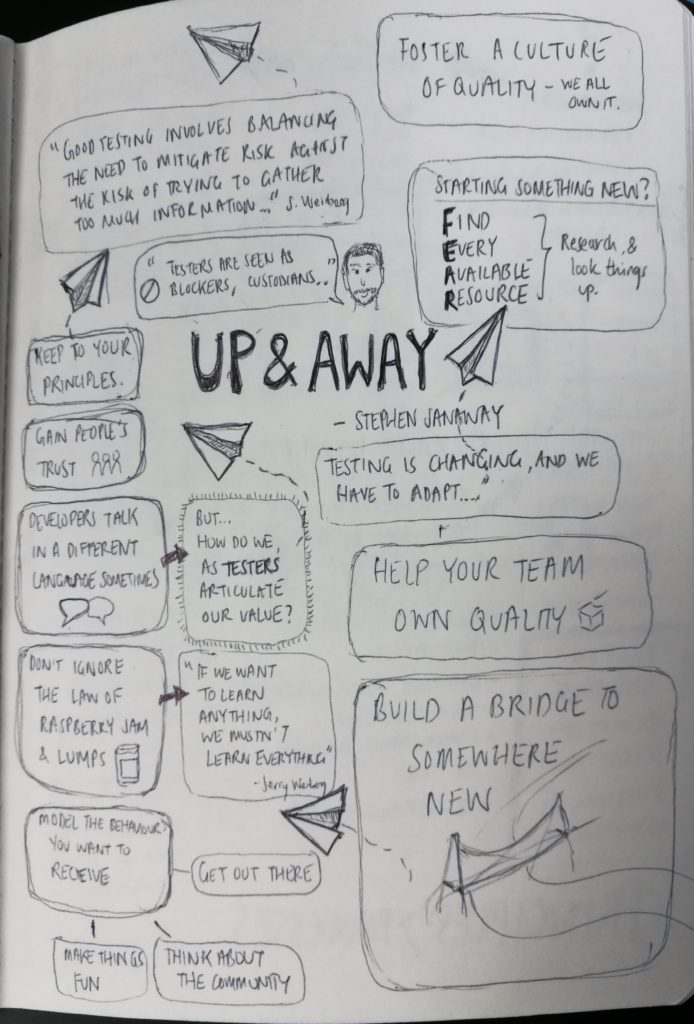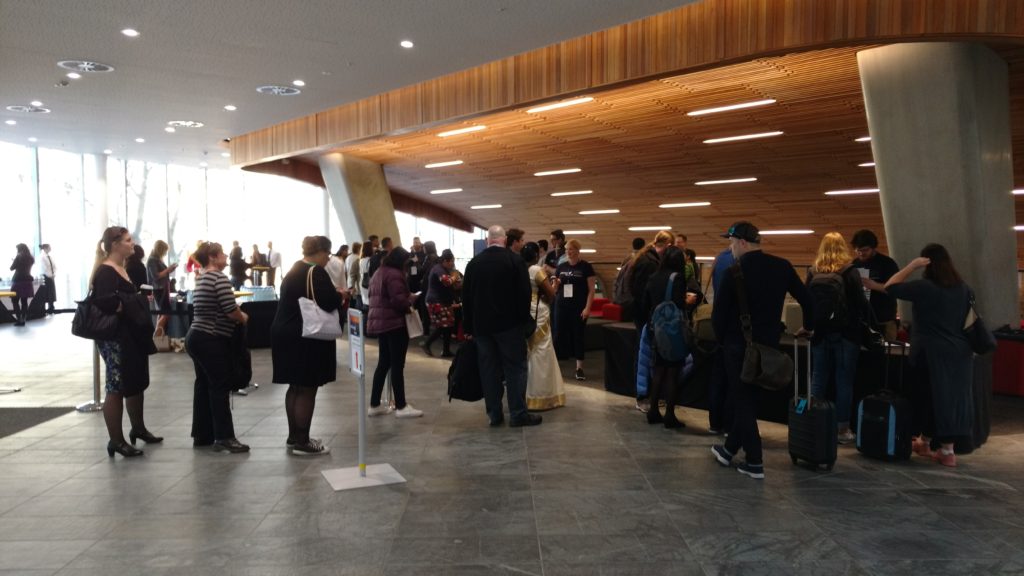tl:dr;
I really loved being a part of WeTest 2016. I gave the opening keynote at both conferences, as well as a couple of other talks at sponsor events. If you came to any of them then this post contains some useful links you may want to read. It was great to meet so many engaged and knowledgeable testers in New Zealand.
The Opening
I was thrilled when I was offered the opportunity to travel over to New Zealand and talk at the WeTest 2016 conferences in Auckland and Wellington. I mentioned my conference speaking goal as part of my presentation at both events – this was that one day someone would invite me to speak in New Zealand. And Katrina Clokie, on behalf of WeTest did just that earlier in the year. It didn’t take long for me to agree to be a part of the conference and being offered the opening keynote was a real privilege.
Now there is one thing that’s clear and that is that it is a long way to New Zealand (28 hours to be precise from the UK). So I wanted to ensure that I made the most out of my short time there and to give a presentation that fitted in with the conference theme of “Influence and Inspire”. Given that I have made a move out of a pure test role over the last few years then this seemed like a logical theme for the presentation, and an opportunity for me to give my views, gained from outside of testing, on how testing is perceived. I also wanted to show the audiences that there’s important leadership roles within testing to be taken and made the most of.
Preparation and Arrival For WeTest
I can say without a doubt that WeTest was the best organised conference that I have spoken at and it’s testament to the effort put in by Katrina, Aaron, Shirley and Dan. All too often presenters at conferences aren’t treated brilliantly by organisers – either by having a lack of support leading up to the event, being expected to pay their own way or by needing to foot the bill for travel and accommodation then claim back. WeTest was different – they organised and paid for all travel up front and sent detailed itineraries for each speaker, plans on how the conference rooms were to be setup, as well as ensuring that the simple things like a taxi to pick you up off a long haul flight was pre-arranged. It made the whole experience easy and it made us speakers feel valued. Other conferences should take note.

Up and Away?
My presentation focused on my views of testing from outside of just testing and how I made a move into software management and why. It was part of a clearly well thought out programme and the other presentations, whether focused on more technical aspects such as mobile testing, or other leadership presentation, fitted together really well. You can see the programme here to get a feel.

Highlights

I thought all the presentations were good but a particular highlight for me was Adam Howard’s “Exploratory Testing Live” where Adam took the really brave step of doing live exploratory testing on the Trade Me website in front of a conference audience. Fair to say it went a bit better in Wellington than Auckland, where he found a bug early on that blocked a lot of the rest of the session but he coped really well and there was value in both sessions. We don’t see enough live testing at testing conferences, it’s common to get live coding at development ones but hasn’t seemed to catch on. Based upon Adam’s session then it should.
Also I really enjoyed Joshua Raine’s really personal story about “Conservation of Spoons” which he did as a noslides presentation. Deeply personal at times and spell binding. I won’t give you the details because I’m sure he’ll do this one again and to know the story would spoil it.
A New Approach to Q&A
As part of my presentation I thought I’d try out the new Q&A feature in Google Slides. It turned out that this was a good move because it enabled me to get questions from the audience as I talked and also to keep a record of all of them for later. If you speak at conferences I’d really recommend it.
For those of you who attended then here’s the questions asked, my responses, and a little more information.
What do you most miss about your testing focused roles?
I guess I miss being the expert with the safety of many years of experience of testing. I also make sure I keep connected to the testing community because it’s great and if I didn’t then that would be the biggest thing that I’d miss.
It’s hard to find a balance between adapting and burning out when trying keep up with new trends and technologies. Do you have suggestions on how to manage that balance?
I make sure I do one thing well; that together with Jerry Weinberg’s Lump Law – “If we want to learn anything, we mustn’t try to learn everything” help me to maintain a balance. Trying to find the one thing to focus on is sometimes hard, but by discussing with your stakeholders and your team then you can usually come to find out what is the most important.
Do you have any resources/suggestions for learning to speak ‘Dev’?
There’s not one clear answer to this – it depends on your context, languages and architecture that you are dealing with. When I started then I tended to use google a lot and base my searches on discussions I’d had with the dev’s in my team. I’d also ask them what they thought I should be learning and why. I’ve also found sites like Hacker News and Stack Overflow to be great for keeping up with what’s happening. Talking Code also comes recommended.
Was your career path in the same company or different? Would you suggest to change companies or progress in one?
It was in the same company and I think it’s much easier to make a change from one path to another when you are in the same company. You have that reputation to use and you are a known quantity. It’s also likely that you’d been working towards such a change as part of your personal development anyway so the company will be confident in your plans.
Since we are talking about change, at any given point during those career changes did you resist the change? How did you over come that? Were you specifically looking for change?
I talked about how it can be scary to make changes but trying something new for 6 months is key. You need to understand that you will go through a change curve just like anyone else and things will feel extremely uncertain as a result at the beginning. I knew what to expect since I’ve been through other changes.
In this case I wasn’t specifically looking for change, more for an opportunity.
Thank you for the nice talk If you had to recommend doing ONE PRACTICAL exercise to raise awareness with the team that WE ALL own quality – what would it be?
I like the idea of whole team testing and bug bashes are a great way of starting.
What do you think testing will be like in 10 years time?
I think we’ll see less traditional testing roles and the focus on automated checking will become more of a development activity. This may mean that there are less testing roles in total but good, exploratory, coaching testers will always have a place in teams. I think the biggest change will affect Test Managers, with far less of a need for them and a transition to coaching roles.
How do you avoid being typecast as just being a tester and overlooked for other career opportunities?
Show that you have an interest to others in your company. Work with your manager to map out your path to a new role and start to show that you are learning the skills that will be required in order to be successful at it.
In short – you own the responsibility for your own career.
A lot of people in this company are transitioning from Waterfall to Agile. Some of the people in the room might gain from you talking to how you see that transition working from the experience you bring, especially if they’re concerned about career development and management.
It does depend a lot on how the management structure adapts. In agile transitions that I have been a part of we’ve changed to autonomous, cross-functional teams with single managers, who have been supported by coaches for both agile, testing and development. This support network is key, as is the establishment of discipline based communities. A strong testing community for example, allows testers whose roles are changing to adapt.
I’ve spoken before about the effect of removing Test Managers from an organisation and the biggest takeaway for me was the need for a strong support network for testers afterwards.
Support from coaches allows not only testers to be supported but also means that someone with testing experience becomes responsible for establishing career paths, competency expectations, etc that can then be used by other managers who are not experienced in managing testers. It also helps maintain a ‘voice of testing’ towards senior management and to enable activities that help testers grow within an organisation.
And Repeat…

The first conference was in Auckland and we repeated the experience again in Wellington three days afterwards. This meant that the whole WeTest circus upped sticks and set off for Wellington for a repeat performance. I also did an “Understand Your Mobile Users” presentation at a sponsor the night before, plus the same WeTest presentation at a sponsors internal conference the day afterwards. Four presentations in one week was something new to me and actually pretty interesting to do as I got into the speed of things. It almost felt like being in a band on tour 🙂
Closing Thoughts
WeTest was great. I met some great people and learnt some new things. It was extremely well run by a passionate bunch of volunteers who knew how to treat their speakers well and how to organise a great programme for the conferences. The testing community in New Zealand is really engaged and it’s clear that there’s some really forward looking testers pushing the boundaries here. If you get yourself over to New Zealand then I’d certainly recommend it. It’s not that far. Really 🙂
One thought on “My Experiences of WeTest 2016”